小学英语语法:一般现在时频率副词
(整理)频率副词有多‘频‘
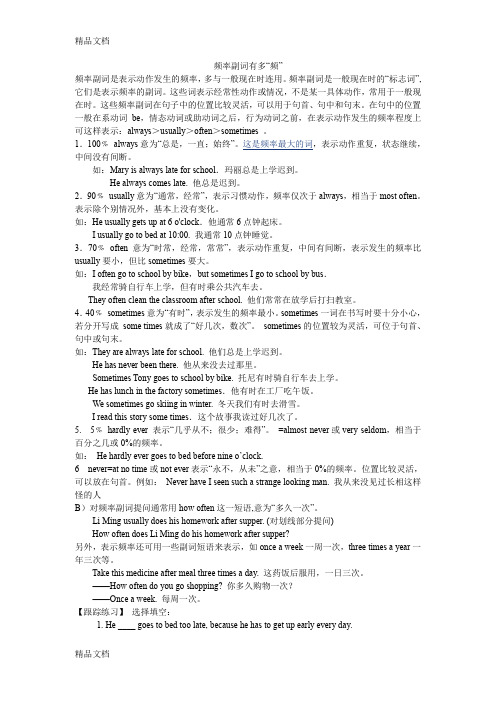
频率副词有多“频”频率副词是表示动作发生的频率,多与一般现在时连用。
频率副词是一般现在时的“标志词”,它们是表示频率的副词。
这些词表示经常性动作或情况,不是某一具体动作,常用于一般现在时。
这些频率副词在句子中的位置比较灵活,可以用于句首、句中和句末。
在句中的位置一般在系动词be,情态动词或助动词之后,行为动词之前,在表示动作发生的频率程度上可这样表示:always>usually>often>sometimes 。
1.100﹪always意为“总是,一直;始终”。
这是频率最大的词,表示动作重复,状态继续,中间没有间断。
如:Mary is always late for school.玛丽总是上学迟到。
He always comes late. 他总是迟到。
2.90﹪usually意为“通常,经常”,表示习惯动作,频率仅次于always,相当于most often。
表示除个别情况外,基本上没有变化。
如:He usually gets up at 6 o'clock.他通常6点钟起床。
I usually go to bed at 10:00. 我通常10点钟睡觉。
3.70﹪often意为“时常,经常,常常”,表示动作重复,中间有间断,表示发生的频率比usually要小,但比sometimes要大。
如:I often go to school by bike,but sometimes I go to school by bus.我经常骑自行车上学,但有时乘公共汽车去。
They often clean the classroom after school. 他们常常在放学后打扫教室。
4.40﹪sometimes意为“有时”,表示发生的频率最小。
sometimes一词在书写时要十分小心,若分开写成some times就成了“好几次,数次”。
sometimes的位置较为灵活,可位于句首、句中或句末。
一般现在时频率副词

目录
• 频率副词在一般现在时中的作用 • 一般现在时中常用的频率副词 • 一般现在时频率副词的用法与注意事项 • 一般现在时频率副词的练习与解析 • 一般现在时频率副词的常见错误与纠正方
法
01
频率副词在一般现在时 中的作用
定义与特点
定义
频率副词是一类表示动作发生频率的副词,常用于一般现在时态中,描述某个 动作发生的次数或频繁程度。
通过使用频率副词,可以表达说话者 对某个动作发生频率的主观评价和态 度,如“他总是迟到”表示说话者认 为对方经常迟到。
02
一般现在时中常用的频 率副词
always(总是)
总结词
表示动作或状态始终如此,没有例外。
详细描述
always用于强调动作或状态的持续性和一贯性,表示始终如此,没有例外。它通 常用于描述习惯性或反复发生的动作或状态,强调动作或状态始终保持不变。
常见错误二:频率副词与时间状语的搭配不当
总结词
频率副词与时间状语的搭配不当是指在使用 频率副词时,没有正确地与时间状语进行搭 配,导致句子意思表达不准确。
详细描述
例如,在句子"I usually watch TV on weekends"中,时间状语"on weekends" 应该与频率副词"usually"进行搭配,表示 通常在周末看电视。因此,正确的句子应该 是"I usually watch TV on weekends."
频率副词与时间状语连用时的注意事项
频率副词与时间状语连用时,应放在时间状语之前,例如“我每周都去健身房锻 炼”,在这个句子中,“每周”是时间状语,“都”是频率副词,应放在时间状语 “每周”之前。
英语语法 什么是频率副词

英语语法什么是频率副词频率副词(Adverbs of Frequency)是用来表示动作或事件发生频率的副词。
它们告诉我们某个动作发生的频率有多高或有多少次。
在英语中,频率副词通常放在句子中动词之前,但放在助动词、情态动词或be动词之后。
下面是一些常见的频率副词和它们的用法:1. Always(总是):表示动作或事件经常发生,每次都发生。
- She always arrives early for work.(她总是早早到达上班。
)- He always brushes his teeth before going to bed.(他总是在睡觉前刷牙。
)2. Usually(通常):表示动作或事件在大多数情况下发生。
- I usually have coffee for breakfast.(我通常早餐喝咖啡。
)- They usually go to the cinema on weekends.(他们通常周末去电影院。
)3. Often(经常):表示动作或事件频繁地发生,但不如always频繁。
- She often goes jogging in the park.(她经常在公园慢跑。
)- He often forgets to bring his umbrella when it rains.(下雨时他经常忘记带伞。
)4. Sometimes(有时候):表示动作或事件偶尔发生,不是经常性的。
- I sometimes eat out with friends on the weekends.(我有时候在周末和朋友外出就餐。
)- They sometimes watch movies late at night.(他们有时候深夜看电影。
)5. Rarely(很少):表示动作或事件很少发生,几乎不常发生。
- He rarely eats fast food.(他很少吃快餐。
)- She rarely gets angry.(她很少生气。
小学英语语法详解时态--—频率副词在一般现在时态中的使用、现在进行时
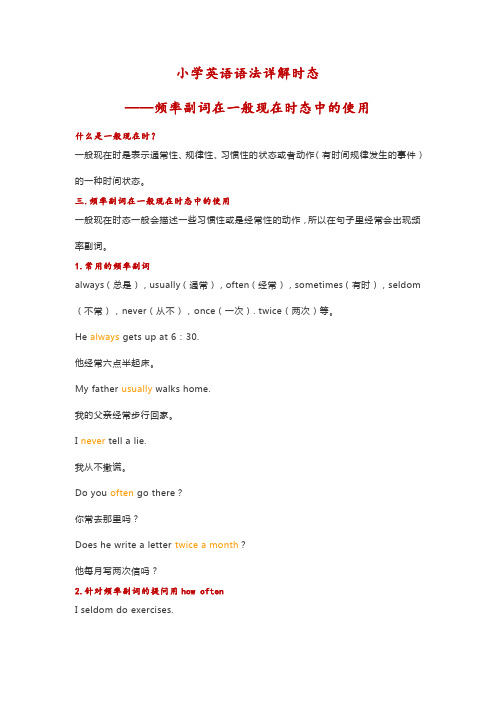
小学英语语法详解时态——频率副词在一般现在时态中的使用什么是一般现在时?一般现在时是表示通常性、规律性、习惯性的状态或者动作(有时间规律发生的事件)的一种时间状态。
三.频率副词在一般现在时态中的使用一般现在时态一般会描述一些习惯性或是经常性的动作,所以在句子里经常会出现频率副词。
1.常用的频率副词always(总是),usually(通常),often(经常),sometimes(有时),seldom (不常),never(从不),once(一次). twice(两次)等。
He always gets up at 6:30.他经常六点半起床。
My father usually walks home.我的父亲经常步行回家。
I never tell a lie.我从不撒谎。
Do you often go there?你常去那里吗?Does he write a letter twice a month?他每月写两次信吗?2.针对频率副词的提问用how oftenI seldom do exercises.我很少运动。
How often do you do exercises?你多久运动一次?Linda老师的小提醒频率副词一般放在动词之前,但有时频率副词也会放在句首,表示强调。
频率副词放在句首时,需用倒装句。
Sometimes she comes late.有时她来得晚。
Seldom does he go there.他很少去那里。
= He seldom goes there.小学英语语法详解时态——现在进行时什么是现在进行时?现在进行时表示现在正在进行着的事情。
Linda老师的小提醒现在进行时态,首先要注意的是“现在”——这件事情的发生不是过去,不是将来,而是现在(说话的当下)。
其次是“进行时”——也就是动作目前的状态是“正在进行中”。
而对于这件发生着的事情,究竟会发生多久,什么时候开始的,不需要考虑。
频度副词的用法口诀整理
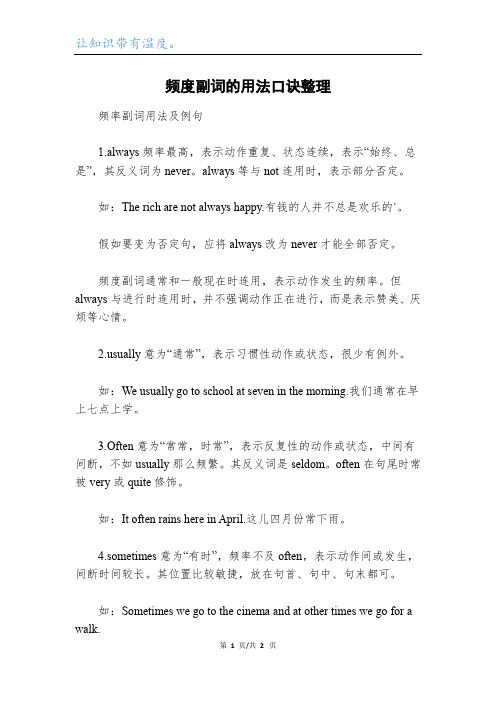
让知识带有温度。
频度副词的用法口诀整理频率副词用法及例句1.always频率最高,表示动作重复、状态连续,表示“始终、总是”,其反义词为never。
always等与not连用时,表示部分否定。
如:The rich are not always happy.有钱的人并不总是欢乐的`。
假如要变为否定句,应将always改为never才能全部否定。
频度副词通常和一般现在时连用,表示动作发生的频率。
但always与进行时连用时,并不强调动作正在进行,而是表示赞美、厌烦等心情。
ually意为“通常”,表示习惯性动作或状态,很少有例外。
如:We usually go to school at seven in the morning.我们通常在早上七点上学。
3.Often意为“常常,时常”,表示反复性的动作或状态,中间有间断,不如usually那么频繁。
其反义词是seldom。
often在句尾时常被very或quite修饰。
如:It often rains here in April.这儿四月份常下雨。
4.sometimes意为“有时”,频率不及often,表示动作间或发生,间断时间较长。
其位置比较敏捷,放在句首、句中、句末都可。
如:Sometimes we go to the cinema and at other times we go for a walk.第1页/共2页千里之行,始于足下。
有时我们去看电影,有时我们去漫步。
5.seldom意为“很少”,这个副词表示否定意义,动作几乎不会发生。
如:He seldom eats breakfast.他很少吃早餐。
hardly具有否定意义,表示“几乎不、简直不”,除非特别状况,否则不会发生。
如:The boy is so young that he could hardly understand it.这个孩子太小了,不行能懂得这件事。
6.never意为“从不”表示动作不会发生。
频率副词有多‘频‘

频率副词有多“频”频率副词是表示动作发生的频率,多与一般现在时连用。
频率副词是一般现在时的“标志词”,它们是表示频率的副词。
这些词表示经常性动作或情况,不是某一具体动作,常用于一般现在时。
这些频率副词在句子中的位置比较灵活,可以用于句首、句中和句末。
在句中的位置一般在系动词be,情态动词或助动词之后,行为动词之前,在表示动作发生的频率程度上可这样表示:always>usually>often>sometimes 。
1.100﹪always意为“总是,一直;始终”。
这是频率最大的词,表示动作重复,状态继续,中间没有间断。
如:Mary is always late for school.玛丽总是上学迟到。
He always comes late. 他总是迟到。
2.90﹪usually意为“通常,经常”,表示习惯动作,频率仅次于always,相当于most often。
表示除个别情况外,基本上没有变化。
如:He usually gets up at 6 o'clock.他通常6点钟起床。
I usually go to bed at 10:00. 我通常10点钟睡觉。
3.70﹪often意为“时常,经常,常常”,表示动作重复,中间有间断,表示发生的频率比usually要小,但比sometimes要大。
如:I often go to school by bike,but sometimes I go to school by bus.我经常骑自行车上学,但有时乘公共汽车去。
They often clean the classroom after school. 他们常常在放学后打扫教室。
4.40﹪sometimes意为“有时”,表示发生的频率最小。
sometimes一词在书写时要十分小心,若分开写成some times就成了“好几次,数次”。
sometimes的位置较为灵活,可位于句首、句中或句末。
小学英语一般现在时
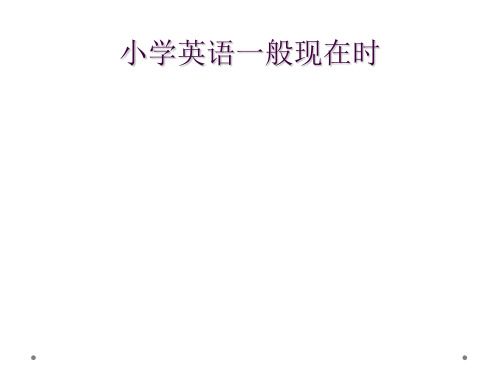
I am Chen Jie. He is a policeman. She is a nurse. It is a snake. We are girls. You are a student. You are students. They are beautiful girls.
一般现在时
(否定句)
Amy and Sarah like playing football.
②主语(第三人称单数)+动词的第三人称单数形 式+其他
如:John usually goes shopping on Sundays. Mike studies English every day.
主语(非第三人称单数)如 I often go to school on foot. You usually go home by bus. We take a shower everyday. They often play basketball on Sunday. Mike and John play football everyday. The students do homework everyday.
①Chen Jie looks like her mother. 陈洁看起来像她的母亲
②Beijing is in China. 北京在中国。 ③My mother often makes cakes.
王叔叔经常做蛋糕。
实义动词第三人称单数的动词形式变化规则: 1、一般情况下,直接加s,如:
reads, plays, works, makes 2、以s, x, ch, sh,o结尾的单词,后加es. 如:
He doesn’t often goes to school on foot. You don’t usually go home by bus. We don’t take a shower every day. They don’t often play basketball on Sunday. Mike doesn’t plays football every day. The students don’t do homework every day.
小学一般现在时(详细讲解)

→ Does Tom’s father listen to English on the radio every evening?
句型转换
• 1. Mr. Green comes from Shanghai. (改为一般疑问句)
常与一般现在时连用的词1every系列evening2频率副词seldomrarelysometimesoftenusuallyalwaysnever3次数一次once两次twice三次threetimes一周两次twiceweek每周四次fourtimesweek每周六saturdays每周日onsundays一般现在时的构成一系动词be的一般现在时1构成
一般现在时
一般现在时(关键词)
现在 经常反复发生 习惯性 规律、真理
1.表示现在的状态: e.g. He’s twelve.
She’s at work.
2.表经常、反复、习惯性的动作: e.g. I get up at 6:30 every day.
He reads English every morning.
4、以“o”结尾的动词,加“es” go-goes [z] do-does [z]
Complete the sentences.
1. My father_l_is_t_e_n_s_(listen) to the radio every day. 2. Mike_st_u_d_i_e_s_ (study) in a middle school. 3. She_t_a_k_e_s_(take) Eddie for a walk after supper. 4. He_w_a_s_h_e_s_(wash) clothes with his hands. 5. Simon _p_a_ss_e_s_ (pass) the ball to Daniel. 6. Miss Li_t_ea_c_h_e_s_ (teach) Chinese. 7. Look at the animal, it _h_a_s_ four legs.
频率副词一般现在时公式
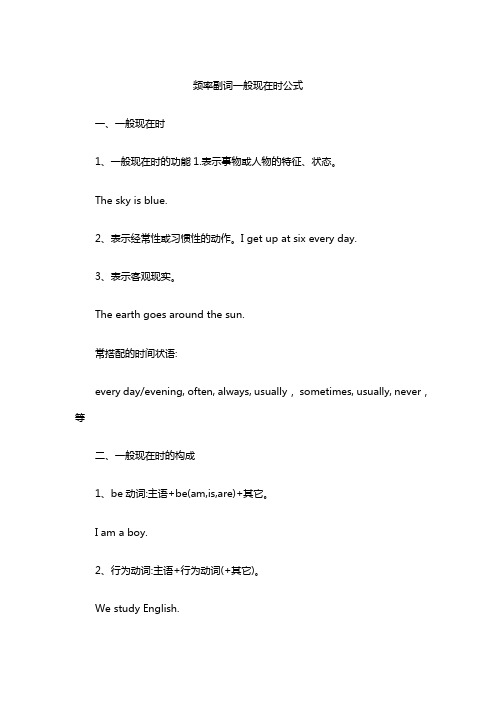
频率副词一般现在时公式一、一般现在时1、一般现在时的功能1.表示事物或人物的特征、状态。
The sky is blue.2、表示经常性或习惯性的动作。
I get up at six every day.3、表示客观现实。
The earth goes around the sun.常搭配的时间状语:every day/evening, often, always, usually,sometimes, usually, never,等二、一般现在时的构成1、be动词:主语+be(am,is,are)+其它。
I am a boy.2、行为动词:主语+行为动词(+其它)。
We study English.3、当主语为第三人称单数(he, she, it)时,要在动词后加"-s"或"-es"。
Mary likes Chinese.二、频度副词1、频度副词的特点表示动作发生的次数,常见的有:always > usually > often >sometimes > seldom ( 很少) > hardly> never ( 决不) (按频率大小排列),once/twice,/three times aweek/month/year等。
always和never、often和seldom各是一对反义词2、在句中的位置通常位于行为动词之前,be 动词、助动词、情态动词之后:He often comes to see us. He is seldom late for school.sometimes, often, usually等可位于句首(因为强调或对比):Sometimes he goes there by bus.3、hardly, seldom和never本身带有否定的意义He hardly goes to see a movie, does he?4、always在否定句中的位置:位于not之后She doesn't always come late.她并非总是迟到。
一般现在时的用法
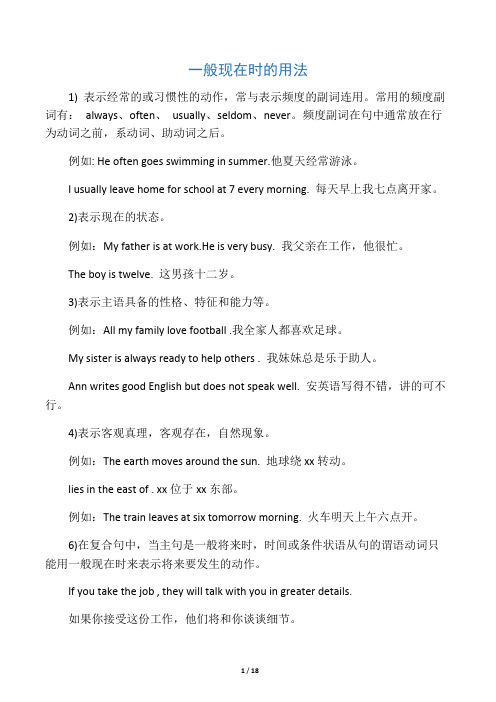
一般现在时的用法1) 表示经常的或习惯性的动作,常与表示频度的副词连用。
常用的频度副词有:always、often、usually、seldom、never。
频度副词在句中通常放在行为动词之前,系动词、助动词之后。
例如: He often goes swimming in summer.他夏天经常游泳。
I usually leave home for school at 7 every morning. 每天早上我七点离开家。
2)表示现在的状态。
例如:My father is at work.He is very busy. 我父亲在工作,他很忙。
The boy is twelve. 这男孩十二岁。
3)表示主语具备的性格、特征和能力等。
例如:All my family love football .我全家人都喜欢足球。
My sister is always ready to help others . 我妹妹总是乐于助人。
Ann writes good English but does not speak well. 安英语写得不错,讲的可不行。
4)表示客观真理,客观存在,自然现象。
例如:The earth moves around the sun. 地球绕xx转动。
lies in the east of . xx位于xx东部。
例如:The train leaves at six tomorrow morning. 火车明天上午六点开。
6)在复合句中,当主句是一般将来时,时间或条件状语从句的谓语动词只能用一般现在时来表示将来要发生的动作。
If you take the job , they will talk with you in greater details.如果你接受这份工作,他们将和你谈谈细节。
巩固练习:1、Lucy likes going skating with her friends. (改写成否定句)________________________________________________________2、Aunt Li’s son has ten toy bears. (对划线部分提问)________________________________________________________3、His watch costs 300 yuan. (变成一般疑问句并否定回答)________________________________________________________4、I like being a nurse for the old. (变成一般疑问句)________________________________________________________5、张叔叔每天乘坐地铁上班。
一般现在时与频率副词
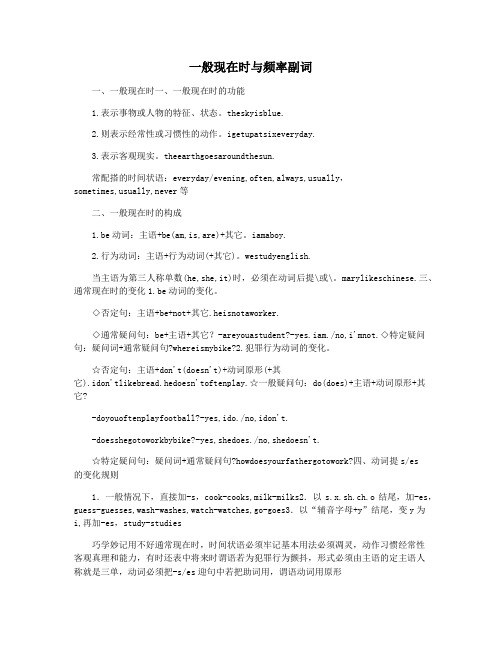
一般现在时与频率副词一、一般现在时一、一般现在时的功能1.表示事物或人物的特征、状态。
theskyisblue.2.则表示经常性或习惯性的动作。
igetupatsixeveryday.3.表示客观现实。
theearthgoesaroundthesun.常配搭的时间状语:everyday/evening,often,always,usually,sometimes,usually,never等二、一般现在时的构成1.be动词:主语+be(am,is,are)+其它。
iamaboy.2.行为动词:主语+行为动词(+其它)。
westudyenglish.当主语为第三人称单数(he,she,it)时,必须在动词后提\或\。
marylikeschinese.三、通常现在时的变化1.be动词的变化。
◇否定句:主语+be+not+其它.heisnotaworker.◇通常疑问句:be+主语+其它?-areyouastudent?-yes.iam./no,i'mnot.◇特定疑问句:疑问词+通常疑问句?whereismybike?2.犯罪行为动词的变化。
☆否定句:主语+don't(doesn't)+动词原形(+其它).idon'tlikebread.hedoesn'toftenplay.☆一般疑问句:do(does)+主语+动词原形+其它?-doyouoftenplayfootball?-yes,ido./no,idon't.-doesshegotoworkbybike?-yes,shedoes./no,shedoesn't.☆特定疑问句:疑问词+通常疑问句?howdoesyourfathergotowork?四、动词提s/es的变化规则1.一般情况下,直接加-s,cook-cooks,milk-milks2.以s.x.sh.ch.o结尾,加-es,guess-guesses,wash-washes,watch-watches,go-goes3.以“辅音字母+y”结尾,变y为i,再加-es,study-studies巧学妙记用不好通常现在时,时间状语必须牢记基本用法必须凋灵,动作习惯经常性客观真理和能力,有时还表中将来时谓语若为犯罪行为颤抖,形式必须由主语的定主语人称就是三单,动词必须把-s/es迎句中若把助词用,谓语动词用原形五、一般现在时用法专练:一、写下以下动词的第三人称单数二、用括号内动词的适当形式填空。
英语语法:一般现在时

rarely
sometimes
often
usually
always
3、次数
一次 once 两次 twice 三次 three times 一周两次 twice a week 每周四次 four times a week 每周六 on Saturdays 每周日 on Sundays
含be一般疑问句的改写
• 秘诀:一调二改三问号
一调:即把句中的be调到主语前;
二改:改换主语称谓,即将句中的主语 I my mine we our ours 等第一人称分别改为相应的第 二人称you your yours等;
三问号:句末的句号改为问号
C. 特殊疑问句: 特殊疑问词+be(am, is, are)+主语+其他?
film dance music dance film comput music er
music compu compute film ter r
dance music film
1. Mary _______ dances. 2. Mary _______ listens to music. 3. Mary _______ goes fishing. 4. Mary _______ plays basketball. 5. Mary _______ plays computer . 6. Mary _______ watches a film.
一般现在时
一般现在时(关键词)
现在 经常反复发生 习惯性 规律、真理
(一)一般现在时的概念
1. 表示目前的情况或状态。 【eg】We’re at school. 我们在上学。 2. 表示主语所具备的性格、特征或能力。 【eg】 They speak English. 他们说英语。 3. 表示现阶段经常性或习惯性的动作。 【eg】The girl goes to school by bike every day. 这个女孩每天骑自行车去上学。
一般现在时的常见频率副词

一般现在时的常见频率副词频率副词在句子中用来表示某个动作或事件发生的频率。
在一般现在时的描述中,频率副词是不可或缺的一部分。
本文将介绍一些常见的频率副词和它们的用法。
1. Always(总是)- 表示频率最高的词汇之一。
它用来表示某个动作或事件在每一次都发生,没有例外。
例如:He always arrives at school before anyone else.(他总是比任何人都早到学校。
)2. Usually(通常)- 表示某个动作或事件经常发生,但并非每次都发生。
例如:I usually go to the gym after work.(我通常下班后去健身房。
)3. Often(经常)- 表示某个动作或事件经常发生,但不如"usually"频繁。
例如:She often helps her mother with the housework.(她经常帮妈妈做家务。
)4. Sometimes(有时候)- 表示某个动作或事件偶尔发生,但并不频繁。
例如:I sometimes eat ice cream for dessert.(我有时候吃冰淇淋作为甜点。
)5. Occasionally(偶尔)- 表示某个动作或事件发生的频率更低,比"sometimes"还要少。
例如:We occasionally go out for dinner on weekends.(我们偶尔在周末出去吃晚餐。
)6. Rarely(很少)- 表示某个动作或事件几乎不发生,非常罕见。
例如:He rarely watches television.(他很少看电视。
)7. Never(从不)- 表示某个动作或事件完全不发生,没有例外。
例如:They never miss their morning jog.(他们从不错过晨跑。
)除了以上常见的频率副词,还有一些其他的词汇可以用来表示不同的频率。
一般现在时总结归纳
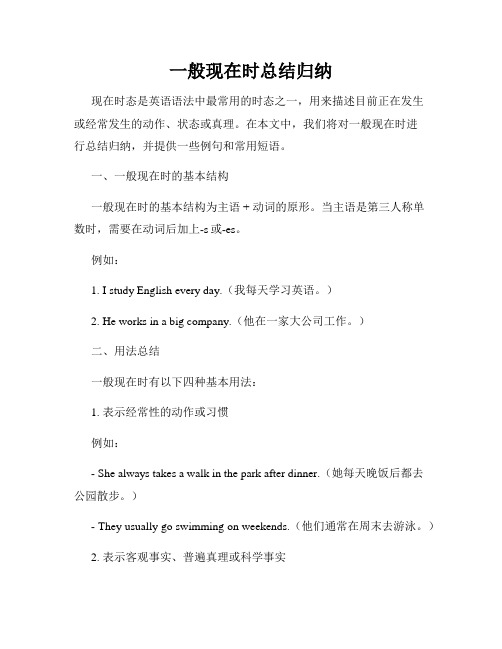
一般现在时总结归纳现在时态是英语语法中最常用的时态之一,用来描述目前正在发生或经常发生的动作、状态或真理。
在本文中,我们将对一般现在时进行总结归纳,并提供一些例句和常用短语。
一、一般现在时的基本结构一般现在时的基本结构为主语 + 动词的原形。
当主语是第三人称单数时,需要在动词后加上-s或-es。
例如:1. I study English every day.(我每天学习英语。
)2. He works in a big company.(他在一家大公司工作。
)二、用法总结一般现在时有以下四种基本用法:1. 表示经常性的动作或习惯例如:- She always takes a walk in the park after dinner.(她每天晚饭后都去公园散步。
)- They usually go swimming on weekends.(他们通常在周末去游泳。
)2. 表示客观事实、普遍真理或科学事实例如:- The sun rises in the east.(太阳从东方升起。
)- Water boils at 100 degrees Celsius.(水在摄氏100度时沸腾。
)3. 表示现阶段的状态例如:- I live in Beijing.(我住在北京。
)- The book belongs to me.(这本书属于我。
)4. 表示评论和说话者的观点例如:- It seems that you are right.(看起来你是对的。
)- The movie is interesting.(这部电影很有趣。
)三、时间状语和频率副词在使用一般现在时时,可以借助时间状语和频率副词来更准确地表达时间和频率。
以下是一些常用的时间状语和频率副词:1. 时间状语- every day(每天)- on Sundays(在周日)- in the morning(在早上)- at night(在晚上)- at present(目前)- now(现在)- this week(这周)2. 频率副词- always(经常)- usually(通常)- often(经常)- sometimes(有时)- rarely(很少)- never(从不)例如:- I often go shopping on weekends.(我经常在周末去购物。
一般现在时结构和用法

一般现在时结构和用法一般现在时是英语语法中的一种时态,也可称为简单现在时。
它表示现在的事情或经常发生的事情,即对某种情况或状态的描述,用于表述一般事实、真相和习惯等。
本文将介绍一般现在时的结构和用法。
一、结构在一般现在时中,主语加动词的原形构成基本句型。
这种基本句型的结构为:主语 + 动词原形(不加s)+ 其他成分如:- I like coffee.(我喜欢咖啡。
)- He speaks English well.(他英语说得很好。
)- They go to school every day.(他们每天去学校。
)特殊的结构包括:1. 第三人称单数时要在动词后面加-s 结尾。
2. 第一人称和第二人称单数和复数不加s 结尾。
- We like to play basketball.(我们喜欢打篮球。
)- You go to bed early.(你早早地上床睡觉。
)3. be 动词的用法。
- I am a teacher.(我是一名教师。
)- They are our friends.(他们是我们的朋友。
)二、用法1. 表示经常性或习惯性的动作或事件。
2. 表示客观事实或真理。
- The earth revolves around the sun.(地球绕太阳转。
)- Water boils at 100 degrees Celsius.(水在100摄氏度时沸腾。
)3. 表示现在状况或状态。
4. 表示总是发生的或普遍存在的事情。
5. 表示计划或安排。
- I meet my friends tomorrow evening.(我明晚和我的朋友们见面。
)- We leave for London next week.(我们下周去伦敦。
)6. 表示评论、解释或说明时。
- Can you pass me the salt, please?(麻烦你把盐递给我好吗?)- I suggest you listen to some music.(我建议你听一些音乐。
一般现在时、频度副词讲解及练习

第二单元语法课堂练习一、一般现在时讲解及练习基本用法(1)一般现在时常表示经常发生的动作或经常存在的状态, 表示此状态时,常和always, often, usually, every day, sometimes等表示时间的状语连用,有时候时间状语可以不表示出来Eg: I go to school every day.(2)表日常行为Eg: The boy wake up at seven o’clock, wash, dress quickly and run into the dining room for breakfast. They wait until they hear the bell and then go toschool.(3)表习惯,能力或现在的特征、状况Eg: Do you drive, Joho?Our monitor is always ready to help others.我们的班长总是乐于助人(4)表客观存在Eg: The earth moves round the sun. 地球围绕太阳旋转(表客观真理)(5)表示一个按规定、计划、安排要发生的事Eg: The train leaves at 7:40练习题:1. Tom is a worker. He _____ in a factory. His sisters _____ in a hospital.A. work/ workB. works/ workC. work/ works2. Who _____ English best in your class?A. speakB. speaksC. speaking3. Mrs. Read _____ the windows every day.A. is cleaningB. cleanC. cleans4. We _____ music and often _____ to music.A. like/ listenB. likes/ listensC. like/ are listening5. She _____ up at six in the morning.A. getB. getsC. getting6. On Sunday he sometimes _____ his clothes and sometimes _____ some shopping.A. wash/ doB. is washing/ is doingC. washes/ does7. The twins(双胞胎)usually _____ milk and bread for breakfast, but Jim _____ some coffee for it.A. have/ haveB. have/ hasC. has/ have8. Jenny ____ in an office. Her parents ____in a hospital.A work /worksB works /workC work /are workingD is working /work9. We will go shopping if it____ tomorrow.A don't rainB didn't rainC doesn't rainD isn't rain11. He said the sun ____in the east and ____in the west.A rose; setB rises; setsC rises, setD rise; sets12. Wang Mei ____ music and often ____ to music.A like; listenB likes; listensC like; are listeningD liking ; listen13. Jenny____ English every evening.A has studyB studiesC studyD studied14. She _____ up at six in the morning.A. getB. getsC. getting15. The students will go to the Summer Palace if it _____ tomorrow.A. don't rainB. doesn't rainC. won't rain16. The picture _______ nice.A. looksB.is lookedC. lookD.is looking17. Don't smoke until the plane ______ off.A. takesB. tookC. was takenD.is take19. You'd better ______ at home and ______ your homework.A. to stay, doB. stay, doC. to stay, to doD. stay, to do20. Uncle Wang knows _______ a washing machine.A. how to makeB. to makeC. how makingD. what to make二、频度副词、短语用法及练习一般现在时常常与always, usually, often, sometimes, seldom, hardly, never等频度副词连用,表示动作发生的频率。
一般现在时的语法公式
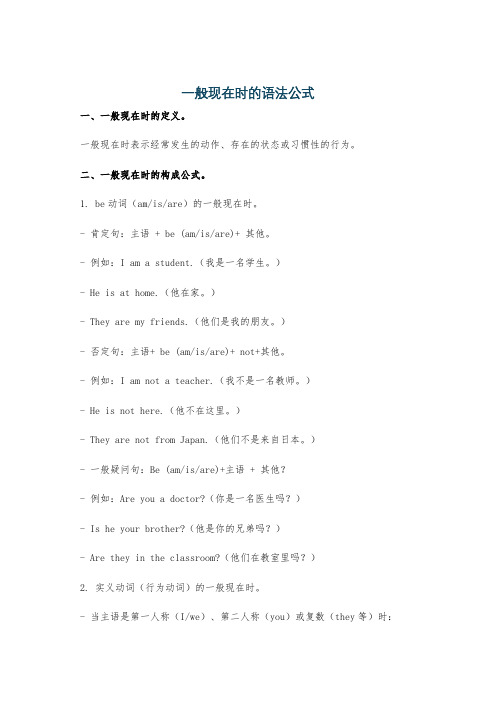
一般现在时的语法公式一、一般现在时的定义。
一般现在时表示经常发生的动作、存在的状态或习惯性的行为。
二、一般现在时的构成公式。
1. be动词(am/is/are)的一般现在时。
- 肯定句:主语 + be (am/is/are)+ 其他。
- 例如:I am a student.(我是一名学生。
)- He is at home.(他在家。
)- They are my friends.(他们是我的朋友。
)- 否定句:主语+ be (am/is/are)+ not+其他。
- 例如:I am not a teacher.(我不是一名教师。
)- He is not here.(他不在这里。
)- They are not from Japan.(他们不是来自日本。
)- 一般疑问句:Be (am/is/are)+主语 + 其他?- 例如:Are you a doctor?(你是一名医生吗?)- Is he your brother?(他是你的兄弟吗?)- Are they in the classroom?(他们在教室里吗?)2. 实义动词(行为动词)的一般现在时。
- 当主语是第一人称(I/we)、第二人称(you)或复数(they等)时:- 肯定句:主语+动词原形+其他。
- 例如:I like reading books.(我喜欢读书。
)- We play football on Sundays.(我们在星期天踢足球。
)- You go to school by bike.(你骑自行车去上学。
)- They have a lot of fun.(他们玩得很开心。
)- 否定句:主语+ don't+动词原形+其他。
- 例如:I don't like math.(我不喜欢数学。
)- We don't watch TV every day.(我们不是每天都看电视。
)- You don't know him.(你不认识他。
小学英语“一般现在时”知识点总结

Fill the blanks 1、I __a_m__ a teacher. 2、She __is___ three years old. 3、She _is__ _n_ot_ a student. 4、They _a_r_e_ _n_o_t_ in the classroom. 5、_I_s__ he a policeman?
一般现在时(The Simple Present Tense)
1.表示现在的状态: e.g. He is twelve. She is at work.
2.表经常或习惯性的动作: e.g. I get up at 6:30 every day.
He often goes to the English corner. 3.表主语具备的性格和能力等:
结构
1. 谓语是be动词: 肯定句:主语+be动词+其他 否定句:主语+be动词+not+其他 一般疑问句:Be动词+主语+其他 特殊疑问句:特殊疑问词+be动词+主语+其他 如: He is Jim’s father. He is not (isn’t) Jim’s father. Is he Jim’s father? Who is he ?
如: (1)I watch TV in the evening.
I don’t watch TV in the evening.
Do you watch TV in the evening?
Yes, I do./ No, I don’t.
What do you do in the evening?
(2)He likes collecting stamps.
一般现在时标志词及例句
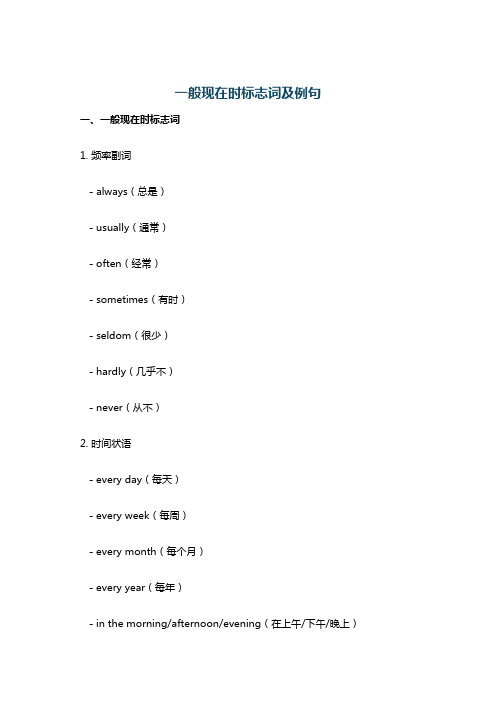
一般现在时标志词及例句一、一般现在时标志词1. 频率副词- always(总是)- usually(通常)- often(经常)- sometimes(有时)- seldom(很少)- hardly(几乎不)- never(从不)2. 时间状语- every day(每天)- every week(每周)- every month(每个月)- every year(每年)- in the morning/afternoon/evening(在上午/下午/晚上)- on Sundays(在周日,这里Sundays复数形式表示每个周日的概念)二、例句1. 使用频率副词的例句- He always gets up early.(他总是早起。
)- She usually goes to school by bike.(她通常骑自行车去上学。
)- They often play football after school.(他们放学后经常踢足球。
)- I sometimes watch TV in the evening.(我有时在晚上看电视。
)- He seldom makes mistakes in his homework.(他在作业中很少犯错。
) - She hardly ever eats junk food.(她几乎从不吃垃圾食品。
)- Tom never tells lies.(汤姆从不说谎。
)2. 使用时间状语的例句- My mother makes breakfast every day.(我妈妈每天做早饭。
)- We have a meeting every week.(我们每周开一次会。
)- He receives a letter from his friend every month.(他每个月收到一封朋友的来信。
)- They go on a trip every year.(他们每年去旅行一次。
- 1、下载文档前请自行甄别文档内容的完整性,平台不提供额外的编辑、内容补充、找答案等附加服务。
- 2、"仅部分预览"的文档,不可在线预览部分如存在完整性等问题,可反馈申请退款(可完整预览的文档不适用该条件!)。
- 3、如文档侵犯您的权益,请联系客服反馈,我们会尽快为您处理(人工客服工作时间:9:00-18:30)。
Complete the sentences
I walk my dog everyday. I _______ walk my dog.
always usually often sometimes
rarely
never
Complete the sentences
I play the saxophone five times a week.
Mon Tue Wed Thu Fri Sat Sun
1 2 3 4 5 6 7 8 9 10 11 12 13 14 15 16 17 18 19 20 21 22 23 24 25 26 27 28 29 30 31
I sometimes play basketball.
Mon Tue Wed Thu Fri Sat Sun
always usually often sometimes
rarely
never
Complete the sentences
I don’t drink alcohol. I _______ drink alcohol.
always usually often sometimes
rarely
never
I often ride my bike.
Mon
Tue
Wed
Thu
Fri
Sat
Sun
1 2 3 4 5 6 7 8 9 10 11 12 13 14 15 16 17 18 19 20 21 22 23 24 25 26 27 28 29 30 31
I play basketball once a week.
Wed
Thu
Fri
Sat
Sun
1 2 3 4 5 6 7 8 9 10 11 12 13 14 15 16 17 18 19 20 21 22 23 24 25 26 27 28 29 30 31
I usually play the saxophone.
Mon Tue Wed Thu Fri Sat Sun
I read a book every day.
Mon Tue Wed Thu Fri Sat Sun
1 2 3 4 5 6 7 8 9 10 11 12 13 14 15 16 17 18 19 20 21 22 23 24 25 26 27 28 29 30 31
I always read a book.
Mon Tue Wed Thu Fri Sat Sun
1 2 3 4 5 6 7 8 9 10 11 12 13 14 15 16 17 18 19 20 21 22 23 24 25 26 27 28 29 30 31
I never drink alcohol.
Mon Tue Wed Thu Fri Sat Sun
Mon
Tue
Wed
Thu
Fri
Sat
Sun
1 2 3 4 5 6 7 8 9 10 11 12 13 14 15 16 17 18 19 20 21 22 23 24 25 26 27 28 29 30 31
I play the saxophone fiTue
Complete the sentences
I play basketball once a week. I _____________ play basketball.
always usually often sometimes
rarely
never
Complete the sentences
Remember
1 1 1 1 1 2 2 2 2 2 3 3 3 3 3 4 4 4 4 4 5 5 5 5 5
I ride my bike twice a week. I ___________ ride my bike
always usually often sometimes
rarely
never
I rarely go to the cinema.
Mon Tue Wed Thu Fri Sat Sun
1 2 3 4 5 6 7 8 9 10 11 12 13 14 15 16 17 18 19 20 21 22 23 24 25 26 27 28 29 30 31
I don’t drink alcohol.
1 2 3 4 5 6 7 8 9 10 11 12 13 14 15 16 17 18 19 20 21 22 23 24 25 26 27 28 29 30 31
I go to the cinema once a month.
Mon Tue Wed Thu Fri Sat Sun
1 2 3 4 5 6 7 8 9 10 11 12 13 14 15 16 17 18 19 20 21 22 23 24 25 26 27 28 29 30 31
1 2 3 4 5 6 7 8 9 10 11 12 13 14 15 16 17 18 19 20 21 22 23 24 25 26 27 28 29 30 31
always usually often sometimes rarely never
0 %
100 %
Remember
once twice three times four times five times
1 2 3 4 5 6 7 8 9 10 11 12 13 14 15 16 17 18 19 20 21 22 23 24 25 26 27 28 29 30 31
I ride my bike twice a week.
Mon Tue Wed Thu Fri Sat Sun
1 2 3 4 5 6 7 8 9 10 11 12 13 14 15 16 17 18 19 20 21 22 23 24 25 26 27 28 29 30 31
I __________ play it.
always usually often sometimes
rarely
never
Complete the sentences
I go to the cinema once a month. I _____________ go to the cinema.
